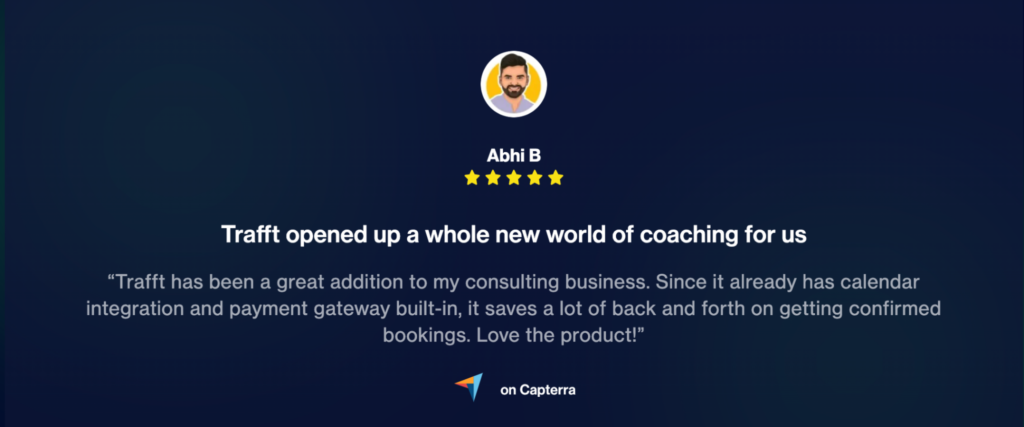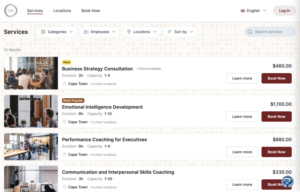Performance coaching is a remarkably useful type of coaching in the workplace that helps improve an employee’s performance and promotes professional development. It’s an opportunity for both employees and leadership to take their skills and performance to the next level.
The premise is simple: set aside time to analyze performance management to see what people are missing. It encourages improvement, changes, and connections.
With performance coaching, leaders focus more on others, managers connect with workers’ issues, and employees find continuous improvement that sustains effectiveness. The coaching process is completely transformed, yet still effective.
But how does one start an effective employee performance coaching program? This article is here to help. Keep reading to learn what is performance coaching, examples of it in action, and tips for operating a performance coaching program.
What Is Performance Coaching?
Performance coaching is characterized by helping individual employees find their strengths, weaknesses, and ways to improve.
Usually, in business contexts, performance coaching is a one-on-one process involving an experienced performance coach, manager, or executive. This often includes sessions regarding wide issues such as motivation, values, and decision-making.
During a session, supervisors use their coaching skills to evaluate and address employees’ weak points and find ways to strengthen them. This is usually done by exposing the employee to diverse experiences to gain the necessary skills.
Employees and supervisors often work collaboratively when planning to create a more personalized performance coaching experience.
Although this type of coaching is usually done individually, it could include using other people within the company. For example, if you would like to encourage leadership development, you could plan a meeting with a leader in your company.
Performance coaches aim to take their students from competence to mastery. This is why these coaches are called high-performance coaches. It’s more than just getting the job done; it’s about being great at it.
The Benefits of Performance Coaching
Performance coaching gives clients a competitive edge and helps improve their performance by developing abilities. But that’s not all, the following are some of the other benefits of this coaching program.
It provides support to employees
Performance coaching allows managers to better support their employees by providing resources to reach their goals. It also encourages communication between managers and employees with questions and concerns.
Delivery is flexible
A coaching culture fosters flexibility by offering diverse delivery methods to cater to individual employee needs.
Coaching can seamlessly integrate into the work routine, allowing employees to learn as they work. Coaches provide real-time support and feedback during specific tasks or projects. This empowers employees to apply new knowledge immediately, rather than weeks later.
Alternatively, coaching can be delivered in dedicated sessions where employees can temporarily step away from their work to focus on their ongoing development. This approach is ideal for areas of expertise that require more in-depth learning and practice.
It’s honest
A performance coach needs to give honest feedback and constructive criticism. Without guidance regarding how something is done wrong, how would employees know when they did something right? Critique is not meant to harm. It’s good!
Performance coaches (or any effective manager for that matter) should assure employees that criticism is only given when there is a good reason. Using constructive feedback will help create an honest environment. This will eventually give employees opportunities to be honest, which will help them become better leaders.
It increases employee self-esteem
Performance coaching creates environments where employees feel respected and needed. Even though the performance coach is likely a manager, they work alongside employees to further improve performance.
Instead of training employees and leaving them to figure the rest out (or worse, never receive training), employees are continually guided by the coach. This is either done by working together or through consistent check-ins.
Coaching helps employees to feel valued. They will in turn be more willing to share responsibility, adapt well to change, and confront challenges.
It provides personal, tailored advice
Performance coaching enables employees to identify their needs and creates a personally tailored development plan to address them. This individual attention is one of the greatest strengths of coaching over other development methods like webinars and workshops.
Although they may be more condensed, webinars and workshops often provide general information that is rarely relevant to the individual. Coaching, on the other hand, is very personal and will often include entirely relevant material.
It’s not just for “problem” employees
Performance coaching helps everyone, not just those scraping by. Often during coaching programs, much of the experience is tailored toward those struggling, and it often leaves out effective contributors who want to improve. Done well, performance coaching helps all employees improve continuously.
Whatever time managers spend helping their best employees is time well spent. Coaching them will have great results for the entire business.
It increases engagement and strengthens retention rates
Performance coaching increases employee engagement by continuously providing feedback and help.
This helps employees stay interested and present. When employees are engaged in the coaching process, they are more likely to be productive and produce higher-quality work.
It builds relationships between managers and employees
Performance coaching is all about relationships. It is based on managers learning more about individual employees through one-on-one meetings.
Personal meetings build trust between employees and managers because they create transparent communication channels.
What Does Performance Coaching Improve?
Performance coaching helps employees develop a wide range of skills. From productivity to management to mindset, performance coaching can help.
The following are some examples of what performance coaching can help with.
Self-knowledge
Self-awareness is crucial for career success, and performance coaches can help drive that self-awareness through continuous feedback. It also helps employees better understand their goals.
This knowledge is further improved through intrapersonal communication (the ability to communicate with yourself using thoughts).
Intrapersonal communication creates a self-image and often helps during times of adversity. Whether it’s giving yourself a pep-talk or just getting through a difficult day, you need to be able to rely on yourself, not only others.
Navigating career change points
We all go through career changes at some point in our lives, and we often need to adapt to fit those roles. When people are promoted to manager they are not necessarily seen as a leader. Coaching can help employees navigate through these changes successfully.
Addressing negative emotions or behaviors
Performance coaching challenges employees, which prevents them from being overly comfortable in their positions. The right challenge makes a positive difference in their performance and encourages employees to be better contributors.
Coaching can help eliminate roadblocks such as
- Fear
- Feelings of inferiority
- Hesitancy
- Guilt
And it can be a much-needed reality check on adverse traits and behaviors like
- Idleness
- Narcissism
- Boorishness
- Inability to listen to others
- Continuous Improvement
This is where performance consultants shine. Performance coaching is all about maximizing employees’ potential, instead of teaching them one particular skill.
Creativity
Although coming up with innovative ideas may seem like a genetic skill, you can actually learn it.
Any leaders who need a more inventive mindset can use coaches to open up their minds to new ideas. They do this by finding new ways to combine, disassemble, reconstruct, and extrapolate old ideas to find room for new ones.
People management
Managers often receive coaching to learn more about leadership. There are many topics that they can learn about, such as how to give feedback or develop ideas.
Coaches do this by asking the right questions to encourage managers to think about the end goal of managing people.
They can also help them define their leadership style, which can help them have a greater presence in the organization.
Public speaking
Many people fear public speaking more than death, but that can be solved.
Many people face this fear by receiving coaching regarding the matter, often focusing on overcoming stage fright or learning to create a compelling story.
What Are the Skills of a Performance Coach?
A performance coach possesses a diverse set of skills to effectively guide individuals or teams toward their goals and improve their performance. Here are the key skills of a performance coach:
Active listening
The ability to attentively listen to clients, understand their concerns, and ask relevant questions is fundamental in performance coaching.
Effective communication
Performance coaches must convey information clearly and offer constructive feedback to facilitate growth.
Empathy
Being able to understand and empathize with the client’s perspective fosters trust and rapport.
Adaptability
Performance coaches should adjust their approach to meet the unique needs and preferences of each client.
Goal setting
Helping clients set clear, achievable goals is a crucial skill in high-performance coaching.
Questioning skills
The ability to ask open-ended and thought-provoking questions encourages clients to explore their thoughts and feelings.
Feedback delivery
Coaches provide feedback that is specific, actionable, and aimed at helping clients advance toward their objectives.
Problem-solving
Coaches assist clients in identifying challenges and developing effective solutions.
Motivation
Motivating and inspiring clients to stay committed to their goals is a central aspect of coaching.
Knowledge and expertise
Coaches often possess expertise in the field relevant to their clients, allowing them to offer insights and guidance.
Time management
Managing coaching sessions and agendas efficiently is essential for making the most of clients’ time.
Creativity
Thinking creatively to come up with innovative solutions and strategies is beneficial in performance coaching.
Self-awareness
Performance coaches must be aware of their own biases and limitations to provide objective guidance.
Stress management
Coping with the stress and challenges that clients may face is important for maintaining a productive coaching relationship.
Goal alignment
Ensuring that the client’s goals align with their values and long-term objectives is a skill that helps clients find fulfillment.
How Is Performance Coaching Different from Life or Business Coaching?
Performance coaching and life coaching are different, even though there are some similarities. In the end, it’s all still coaching.
Performance coaching and life coaching are both focused on one goal, helping clients. The main difference is that life coaching is a more holistic discipline, with psychological or spiritual issues being the main problem in one’s life. Life coaches will often focus on things in careers, relationships, and day-to-day life.
There are also many similarities between performance coaching and business coaching. Both of these practices improve business performance through coaching sessions, although they do differ in purpose and focus.
Business coaches focus on entire business growth, taking small start-up businesses to corporation levels. They focus on helping business owners develop a vision of their company and start working towards that goal.
Performance coaches, on the other hand, focus on the individual. They help clients with personal performance goals and help them overcome hardships to reach those goals.
Trafft – the best scheduling software for performance coaches
If you’re a performance coach looking for the perfect scheduling solution, Trafft is the scheduling software for coaches, tailored just for you.
Trafft goes beyond the basics, offering a wide range of powerful features designed to streamline scheduling, boost your coaching practice, and enhance the client experience.
Here’s why Trafft is the go-to choice for coaches:
Efficient Scheduling: Trafft’s platform is designed to minimize scheduling errors, ensuring that your coaching sessions run smoothly without any no-shows or double bookings. You can rely on Trafft to keep your coaching schedule organized and efficient.
Advanced Coaching Features: Trafft offers a suite of advanced features that cater to coaching businesses. Enjoy support for multiple locations, multi-language capabilities, recurring appointments, and group bookings. You can easily reschedule sessions, set up reminders, and customize booking forms to match your coaching services.
Integration Power: Trafft seamlessly integrates with popular tools like MailChimp, Google Analytics, Stripe, PayPal, and Zapier. Plus, it provides native integrations with Zoom and Google Meet for scheduling virtual coaching sessions. This level of integration simplifies your workflow and enhances your coaching services.

Business Insights: Trafft provides insightful business dashboards that help you gather essential metrics. These metrics are invaluable for making data-driven decisions and improving your coaching practice.
Enhanced Customer Experience: Take notes on your clients to personalize their coaching experience. This feature allows you to build stronger relationships with your clients and better understand their needs.
Secure Payments: Trafft’s integrated payment processing ensures that you always receive timely payments, whether it’s after the coaching session or in advance. This feature is crucial for managing your finances and reducing the risk of no-shows.
Affordable Pricing: Trafft understands the needs and budgets of coaching businesses. It offers a free plan for up to 5 members, making it accessible for small coaching practices. Paid plans start from just $29 per month, allowing you to scale as your coaching business grows.
Top Ratings: Trafft is highly rated by users, earning a 5/5 on Capterra, 4.7 on G2, and excellent ratings on TrustPilot and GetApp. Coaches like you trust Trafft for their scheduling needs.
Don’t wait any longer; sign up for Trafft for free today and experience why it’s the best scheduling solution for coaches.
Supercharge your coaching practice and provide your clients with a seamless booking experience.
Your coaching journey starts here with Trafft.
Tips for Performance Coaches
Now that you have learned what performance coaching is, and what benefits it includes, you need to learn how to be a performance coach. Here are some important tips.
Remember, performance coaching is about asking, not telling. At each stage, try to resist the urge to tell your employees what to do. Instead, try to focus on asking the right questions, listening to their answers, and challenging them to be better.
Demonstrate your belief in your employee’s ability to improve
Make sure that you demonstrate your confidence in an employee’s abilities to solve a problem. You may think it unnecessary, but often untold confidence goes unnoticed.
Instead, try inviting the employee to work with you on a project, and show your confidence during this project. By implementing this strategy you will improve the employee’s contributions and engagement in future projects.
Agree on a written action plan
Often to acquire buy-ins and commitment, supervisors and employees need to work together to create an action plan. This plan should include important topics like performance goals and ways to reach those goals.
Find employee motivations
Employees need to have motivations to succeed and learning what motivates employees is part of your job.
You can do this by asking open-ended questions and using visualization exercises. Before immediately fixing or changing things, gain insight into your employees. Your employees will need proper motivation before committing to compliance.
Build a coaching culture
One of the most important elements of a successful coaching program is a strong coaching culture within an organization.
This means you have to create an environment where employees want to learn and help others. You can do this by promoting progressive learning. Progressive learning will give employees the motivation to learn and improve even when it isn’t necessary.
Describe the problem to the employee
The coach’s main job is to find out what is lowering productivity by understanding employees better.
Then, when you have discovered the problem or behavior causing problems, explain it to the employee. You can do this by using descriptions of the behavior with examples so that both you and the employee understand the problem well.
Develop trust
In coaching, trust is key. Without trust, a supervisor will not believe an employee’s stories, and employees won’t want to share their struggles. This is why a mutual interest for the success of both parties is critical. You can also start building trust through open, two-way feedback and respect.
Ask guiding questions
Guiding questions are a series of questions that lead individuals to explore different solutions using their problem-solving skills. Guiding questions can also help you teach, especially when you are leading an employee to an important point.
Collect 360 feedback
Feedback is a great way of identifying where you can improve as a coach. You can ask for feedback from your employees during your meetings, or you could use surveys.
Either way, the feedback will give you new ideas to improve your coaching processes, refine your work relationships, and communicate performance results.
Monitor performance regularly

Last of all, try to monitor employees’ performance regularly to discern the impact of your coaching. Try to measure progress against each employee’s specific goals. Each employee is different; therefore, each will have different ways of measuring their success.
Remember, performance management is an ongoing process. This means that you will need to continue to nurture dialogue between yourself and your employees. You also can inspire your employees to manage their performance by regularly conducting deep self-appraisals. This can greatly help motivation and will likely be a skill they will use throughout their careers.
Performance Coaching Examples
Example #1: A sales manager notices that a sales representative is struggling to close deals. They schedule one-on-one coaching sessions to review the representative’s sales calls, provide feedback on their pitch, and practice objection handling. Over time, the sales representative’s performance improves, leading to increased sales and revenue for the company.
Example #2: An employee with leadership potential is identified by their manager. They start a coaching program focused on developing leadership skills. The employee is given opportunities to lead small projects, and the coach provides guidance on effective communication, decision-making, and team management. As a result, the employee becomes a more effective leader within the organization.
Example #3: Two employees on a project team are constantly clashing, leading to decreased productivity. A coach is brought in to mediate and provide conflict resolution coaching. Through facilitated discussions and conflict management strategies, the employees learn to work together more harmoniously, resulting in a more efficient team.
Example #4: An employee consistently falls short of their sales targets. Their manager creates a Performance Improvement Plan, which includes specific goals and a timeline for improvement. A coach is assigned to work with the employee to provide training, monitor progress, and offer guidance. Over the course of the plan, the employee’s performance steadily improves.
Example #5: During a performance review, an employee receives feedback on their communication skills. Their manager suggests a coaching program to address this. The coach conducts communication workshops and provides individual coaching sessions to help the employee refine their communication style, resulting in more effective interactions with colleagues and clients.
Example #6: A new hire is struggling to adapt to the company’s culture and expectations. A coach is assigned to provide onboarding coaching, introduce the new employee to key colleagues, explain company values, and set performance expectations. This helps the employee integrate more smoothly into the organization.
FAQ About Performance Coaching
1. How do performance coaches measure success?
Performance coaches measure success by actively tracking progress towards the objectives set at the start of the coaching engagement. This involves a combination of qualitative and quantitative methods, including monitoring performance indicators, conducting tests and surveys, and soliciting input from stakeholders or clients. The coach and client collaboratively establish specific performance standards and regularly monitor their progress.
Success can also be gauged by the client’s enhanced leadership abilities, improved work-life balance, or heightened self-awareness.
2. What are some common challenges that performance coaching can help with?
Performance coaching can address various issues, such as boosting self-confidence, honing leadership skills, conquering impostor syndrome, handling stress and burnout, and enhancing communication abilities.
The primary aim of coaching is to assist clients in identifying areas for personal growth and formulating effective solutions to their challenges.
Additionally, performance coaching uncovers blind spots and challenges limiting beliefs that might hinder clients from reaching their full potential.
3. How long does it typically take to see results from performance coaching?
The time it takes to reap the rewards of performance coaching depends on factors like clients’ goals, commitment level, and the complexity of challenges. Some clients experience benefits in just a few coaching sessions, while others may require ongoing support over several months.
Coaches work alongside clients to establish a clear timeline for achieving their objectives and consistently assess progress toward these milestones. Remember, the success of performance coaching hinges on clients’ effort and commitment.
4. What are some of the key skills that a performance coach should possess?
A performance coach must possess several crucial skills, including active listening, effective communication, empathy, adaptability, creativity, and the ability to provide constructive feedback.
These skills are put into action when coaches build strong connections with their clients, ask open-ended questions, and motivate them to delve into their thoughts and emotions. Coaches should also be adept at tailoring their coaching style to meet each client’s specific needs and preferences while offering valuable feedback that propels clients toward their goals.
5. How does performance coaching differ from traditional mentoring or counseling?
Traditional mentoring or counseling differs from performance coaching in several key ways.
Coaching is primarily focused on helping individuals or teams achieve specific goals and enhance their performance. In contrast, mentoring involves an experienced individual sharing their knowledge and expertise with someone less experienced. Counseling, on the other hand, is typically geared toward helping individuals address psychological or emotional issues.
While coaching may involve understanding core beliefs or thought patterns, the main emphasis is on creating practical strategies to achieve specific outcomes, rather than delving into the past or exploring emotions.
Counseling often places a greater emphasis on healing emotional wounds from the past or addressing current traumas, whereas coaching tends to have a stronger focus on setting and achieving future-oriented goals.
6. Is performance coaching only for individuals, or can it be used for teams or organizations as well?
Performance coaching offers valuable benefits to teams, organizations, and individuals. Teams and organizations can leverage coaching to enhance collaboration, improve communication, and cultivate leadership skills.
Coaches work with teams to establish shared goals and develop strategies for achieving these objectives, or they may provide individual coaching to team members to equip them with the skills needed to excel as team contributors.
Furthermore, coaches can partner with businesses to design tailored plans aimed at increasing productivity, elevating staff morale, and fostering employee engagement.
How Will You Use Performance Coaching?
Performance coaching helps everyone. It helps underperforming employees, effective employees, and even managers. It’s a powerful tool, but just like all tools, it needs an effective wielder.
Remember, the goal of performance coaching is not to make someone feel bad, nor is it to showcase the knowledge of a manager or HR professional. The goal of performance coaching is to help employees improve their work and solve their performance problems.
Employees who respond to performance coaching well will not only improve their performance but will also become valued contributors. What could be more rewarding than that?
Hungry for more?
We have just what you need! Dive into additional resources about coaching and gain more knowledge:
- How to Start a Coaching Business: A Step-By-Step Guide
- The Best Coaching Questions You Could Ask Your Clients
- Guide to Coaching Business Models with Examples
- How to Create an Efficient Coaching Schedule
- The Best Coaching Apps to Take Your Business to The Next Level
- Coaching Scheduling Software: Top 7 Picks & In-Depth Reviews



